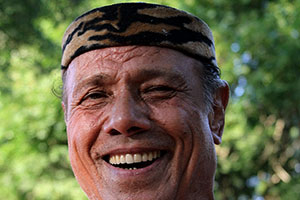Jimmy “Superfly” Snuka, a retired professional wrestler, will not face a trial for causing the death of his mistress in 1983. Accepting expert testimony offered by the defense, the court agreed that the 73-year-old Snuka is not competent to stand trial. The court therefore dismissed the charges.
Allegations of Murder
A native of Fiji, Snuka lived with his family in the Marshall Islands before moving to Hawaii. He became a bodybuilder, earning the titles of Mr. Hawaii, Mr. Waikiki, and Mr. North Shore before turning his attention to professional wrestling. Snuka had a successful career in the World Wrestling Federation until 1992, and continued to make guest appearances at special events until his 2015 arrest.
On May 11, 1983, Snuka was taping a WWF event at the Allentown Fairground in Lehigh Valley, Pennsylvania. Snuka went to his hotel room in Whitehall, where Nancy Argentino was staying. Argentino and Snuka occasionally spent the night together when Snuka was not home with his wife.
Snuka told the police that he entered the room and found Argentino gasping for air. He called the front desk and hotel employees called an ambulance. Paramedics took Argentino to the Lehigh Valley Hospital, where attempts to save her life were unsuccessful.
An autopsy, which the district attorney’s office refused to release for the next three decades, concluded that Argentino suffered from head injuries. A forensic pathologist also found two dozen cuts and bruises on the body. The pathologist concluded that the death was suspicious and recommended that it be investigated as a potential homicide.
The police identified Snuka as a “person of interest” but he was never charged with Argentino’s murder. The case remained open and under investigation for the next 32 years.
Charges Filed
In 2013, reporters for The Morning Call investigated Argentino’s death. Their report of the details of the case apparently motivated the Lehigh Valley District Attorney to take “a fresh look” at the evidence.
The strongest evidence against Snuka, apart from his connection to Argentino, consists of admissions he allegedly made to various people that he shoved Argentino, causing her to hit her head. Snuka later said that his statements were misunderstood and that Argentino slipped and hit her head after stopping to go to the bathroom at the side of the highway. What Snuka told the police cannot be verified because a tape recording of Snuka’s police interview has “gone missing” from the police evidence locker.
The district attorney acknowledged that no new evidence had surfaced and that the case against Snuka “hadn’t improved with age.” The medical examiner also told the press that “clear-cut forensics weren’t there” and admitted that the forensic evidence did not establish “a clear-cut case” of murder.
The district attorney nevertheless asked a grand jury to indict Snuka. The medical examiner told the grand jury that Argentino’s brain injury probably occurred 12 to 24 hours before her death. He testified that the injury was consistent with her moving head striking a stationary object, but not consistent with a fall. Of course, the science of brain injuries has advanced considerably since the medical examiner formed that opinion.
Grand juries nearly always follow a prosecutor’s lead. Predictably, the grand jury charged Snuka with third-degree murder and involuntary manslaughter. The grand jury alleged that Snuka repeatedly assaulted Argentino “and then allowed her to lie in bed … without receiving the necessary medical attention.”
The defense contends that other evidence casts substantial doubt on the prosecution’s case. A gag order, however, prevents either party from discussing the evidence outside of court.
Competency Challenged
The Constitution forbids bringing criminal defendants to trial unless they are mentally capable of understanding the charges and assisting in their defense. Challenges to a defendant’s competency to stand trial are usually supported by psychologists, psychiatrists, neuroscientists, and other experts who evaluate a defendant’s ability to understand legal proceedings.
Snuka’s attorney contended that Snuka suffers from dementia and is not competent to stand trial. He theorized that substance abuse and head injuries sustained during his wrestling career accounted for the dementia. The presiding judge held four hearings to consider evidence in support of that allegation.
Testifying for the prosecution, forensic psychiatrist John O’Brien told the judge that Snuka changes his behavior according to the situation. He testified that Snuka “doesn’t behave in a manner that suggests oblivion.”
That testimony was contradicted by forensic psychologist Frank Dattilio. Testifying for the defense, Dattilio said that Snuka is a “shell of a man” who does not even know why he is in court. Dattilio testified that Snuka’s brain is shrinking.
Court’s Ruling
The judge questioned Snuka before ruling. She rejected the prosecution’s contention that Snuka was faking dementia, commenting that she didn’t think Snuka was smart enough to give a convincing performance. She observed that Snuka could not effectively testify in his own defense because an attorney “could get him to say or agree with anything on the witness stand.”
She also noted that delaying the prosecution for 30 years contributed to the difficulty of giving Snuka a fair trial in light of the mental impairment that he has suffered. That might have been a subtle way of suggesting that reviving a criminal investigation after three decades because of a newspaper story does not serve the ends of justice.
After the judge ruled that Snuka was not competent to stand trial, she rejected the prosecution’s request to order Snuka into involuntary treatment. Forced treatment can be an option when a mental impairment can be cured by medication, but dementia typically does not respond to treatment.
The judge instead told the parties to come back to court in six months. The judge received an update of Snuka’s condition in December. Learning that his health had deteriorated and that he is now receiving hospice care, the judge concluded that Snuka will not regain competency to stand trial. She therefore dismissed the charges.
Paparazzo Photography [CC BY-SA 3.0 or GFDL], via Wikimedia Commons




